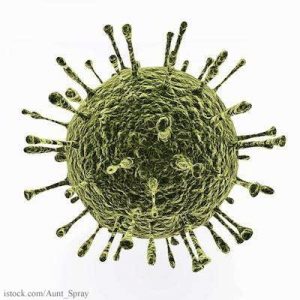What do norovirus and baked-on lasagna have in common? Both can survive the dishwasher.
 Researchers at Ohio State University have made a discovery that may help to explain why restaurants have a hard time controlling the spread of norovirus, the leading cause of food poisoning worldwide. About half of all foodborne illness outbreaks in the US are caused by norovirus, most of them, about 80 percent, happen between November and April, according to the Centers for Disease Control and Prevention (CDC).
Researchers at Ohio State University have made a discovery that may help to explain why restaurants have a hard time controlling the spread of norovirus, the leading cause of food poisoning worldwide. About half of all foodborne illness outbreaks in the US are caused by norovirus, most of them, about 80 percent, happen between November and April, according to the Centers for Disease Control and Prevention (CDC).
Norovirus is a virus that can get on food at any point from farm to table. Foods that are eaten raw are such as leafy vegetables, fruit, and shellfish, are most commonly involved in norovirus outbreaks. Sick food handlers are frequently the source of outbreaks such as the recent Salmonella outbreak in Illinois.
“Proper sanitation and handling remain the single biggest factor that can prevent cross-contamination of food and dishwashers at food service establishments, said Melvin Pascall, associate professor, Department of Food Science and Technology at Ohio State. However, it appears that we need to identify better agents or methods to significantly reduce the presence of norovirus and work to update the protocols.”
What Pascal and the team of researchers at Ohio State University found is that, unlike bacteria, norovirus can survive manual and automatic dishwashing cycles. “Now we can see that the protocols are less effective at removing and killing viruses – and this may help explain why there are still so many illnesses caused by cross-contaminated food,” he said.
The researchers used two foods that are difficult to clean-cream cheese and reduced fat milk and infused them with norovirus, and two kinds of bacteria: E. coli and Listeria. They applied the tainted dairy products to stainless steel utensils, ceramic plates and glassware, and ran them through a commercial dishwasher. They found that dishwashing could kill off enough E.coli and Listeria to meet safety standards but not the norovirus. Hand washed dishes were more likely to contain traces of both bacteria and viruses than those cleaned in a commercial dishwasher.
”These results would indicate that the neither the detergents nor sanitizers used in current cleaning protocols are effective against the norovirus at the currently used concentrations,” said Jianrong Li, assistant professor of food virology. Another great reason for sick restaurant workers to stay home.




